- Home
- Will Hobbs
City of Gold Page 9
City of Gold Read online
Page 9
Merlin wondered if I’d been able to talk with the marshal. “I did,” I said. “It wasn’t exactly a conversation. It felt like cat and mouse, and he was the cat.”
“He’s the cat, all right, and he’s been jumpy as one lately. Talk has it he’s got four Winchester rifles ready at certain locations around town. He’s always had enemies, but more so since he got his job back.”
“I got the idea he’s a fighting man.”
“Of the first order, fists or guns. He’s a crack shot with revolver or rifle—the fence out at the cemetery is his personal shooting range. Certain letters in the signs are his targets. When he first came to town, back in ’87, Telluride wasn’t like you find it now. I mean to say, it was rough.”
“How rough?”
“Well, the rowdies and the bandits were running wild and shooting up the place—had a regular reign of terror going. When Jim Clark came to town, he was digging ditch for a pipeline. In the midst of a ruckus, he walked into the mayor’s office and said he would arrest the malefactors if he had a badge. And he did, without firing a shot.”
“But how?”
“Cracking the toughs up the side of the head with his six-shooter! He marched them to the clink and that was that. Jim Clark got my vote in the special election for marshal. He became a fearsome presence on horseback or patrolling afoot. At the same time he was making extra money as a bill collector. Down from the mountain, in town socializing or gambling, you’d get a tap on your shoulder. Uh-oh, it was the marshal. All he’d say was the name of the merchant you owed money to, which meant you better pay up quick. Clark is nothing if not an enigma. On occasion he helps the needy and the old folks. Does chores, makes repairs.”
“Yet he shows no interest in helping me,” I said bitterly.
“Nobody knows what to expect from Jim Clark. Likes to keep you guessing.”
“So, what do you make of the talk about him being in on the bank robbery in ’89?”
“In cahoots with Butch? A lot of folks believe he was, me included. That’s not the only story in that vein. He may have done some moonlighting in various disguises as a hold-up man. Typically the victims were on their way out of town after withdrawing their money from the bank. He was also rumored to be on the take when stagecoaches with gold shipments were robbed. Suchlike suspicions, along with his foul temper and brutal treatment of prisoners, led to his firing after the Butch Cassidy robbery. His history before Telluride is murky, but he’s said to be from Missouri and to have fought with Quantrill’s Raiders.”
“Who burned Lawrence, Kansas, in ’63,” I shot back. “That’s where I’m from.”
“War is madness! The marshal makes no bones of having fought for the Confederacy. He’s proud of it.”
“Where did he go when he was fired?”
“He turned up in Leadville later in ’89—got shot in the leg, we heard, in some kind of altercation. It came to light he had two felonies on his record dating back to his teens. Seems he stole his stepfather’s mule and lit out with a friend for Texas, where they traded the animal for six-shooters and stuck up a rancher for fourteen hundred dollars. You Americans are nothing if not colorful. By ’93 the ruffian crowd had taken over Telluride again, and the powers that be gave him his badge back.”
Needless to say, this conversation gave me plenty to chew on regarding the man who might or might not help me recover our mules. If Clark would take it on, he was the right man for the job. As to Hercules, I could pretty well guess the marshal was beholden to those “powers that be” that Merlin alluded to, including the Tomboy Mine. Come December he would have to do something when Colorado’s new book of registered brands was published. In the case of Peaches, it sounded like he might be willing to do something sooner. I could picture the marshal busting our skunk up the side of the head with his revolver. Such were my ruminations as I made my way to the telegraph office.
Here’s what I came up with, to the tune of a half dollar: SPENT MONDAY WITH HERCULES STOP GOT A LINE ON PEACHES STOP TALKED WITH MARSHAL STOP WISH ME LUCK STOP
My message was less than forthcoming but what could they expect from a telegram? It would’ve cost a chunk of my funds to tell Ma and Till what was really going on with Hercules. Everything was so complicated and uncertain, and I didn’t want to worry them. I felt bad about leaving the mine disaster out of it, too, but they could read about that in the Durango Herald.
That evening, the atmosphere in the Miners Hall was dense and electric. Dense, in that it was crowded with twice as many men as comfort would have allowed. The board of Local 63 called the meeting to honor the dead, but every man there was expecting more, and that expectation is what I mean by “electric.” The sorrow every miner was suffering was coupled with anger. Rage would be more accurate, over the absence of metal doors that could have sealed the mouth of the Bullion Tunnel when the fire broke out. Was the board going to call for a strike?
To my astonishment they brought me up on the stage to stand with the board. With great solemnity they read the roll of the dead, citing each man’s birthplace and what was known of his family. Most came from across the ocean, most were unmarried. There were cries of pride and grief from their countrymen as their countries were called.
I’ll never forget what it was like to be looking at that sea of faces. From that day forward, laboring men who work the dirtiest, most hazardous, and most thankless jobs would never be faceless to me.
After the roll was called, one of the board members stood up to make an announcement. “Some of you may be wondering,” he said while pointing me out, “what this kid is doing here.” The throng buzzed over that a bit, and then he said, “This here’s Owen Hollowell from Durango, nephew of Jacob Hollowell.”
At that I got the same reception I received at the boarding house, multiplied a hundredfold. Fortunately all I had to do was wave.
Then the president of the union was announced to a thunderous ovation. It went on for a good long while. They were hailing Vincent St. John for his courage.
When the cheers subsided, the hall got quiet as a churchyard. “I’m going to be brief,” their young leader began.
“Don’t forget those doors!” a voice called.
“We’ll have them for certain,” St. John replied. “Arthur Collins is away on business in Mexico, as some of you have heard, but the acting superintendent—his brother Edgar—says we have his word.”
A ripple of contempt ran through the hall along with strong approval of a victory won, if at appalling cost.
“This isn’t a time for rancor,” St. John said forcefully. “Nor is it time for talking about a strike, though that may come, as all of us know. This is the time to honor our friends. This is the occasion and now is the time, your elected leaders believe, to do something fitting in memory of them. Something that will stand the test of time.”
The man’s person, his bearing, his voice . . . there was something you couldn’t put your finger on, but Vincent St. John had the ability to reach into hearts. “All the losses we’ve suffered,” he continued, “as you graybeards know all too well . . . the cave-ins, explosions gone wrong, electrocution, snowslides and rock slides, miners’ consumption, pneumonia, the deadly roll call goes on and on. Is there an occupation more inimical to health and downright dangerous than ours? No, there is not. Dr. Hall’s hospital has done wonders for its size, but the population of Telluride and its environs, counting the men up at the mines, is pushing five thousand. In light of this new calamity of fire and smoke, we have to ask, what if dozens had been injured? It’s a shame that Telluride is so unprepared and so lacking. A crying shame!”
I heard cries of agreement and anger, but mostly the members were wondering what St. John was getting at.
“Here’s what we’re thinking, men, and we’re hoping you’ll agree. The town won’t levy taxes for a new hospital, and the mine owners won’t even contribute, much less foot the bill. Who does that leave but us? Out of this tragedy, with your consent, is born a vision.
Paying for it over a period of time will mean sacrifice from every one of you, but this will be our legacy: a forty-bed hospital with room for seventy in emergencies. We can afford it if we build it with our own hands . . . the Miners Union Hospital!”
For a few moments there was dead silence. Then, like a swelling wave, their approval rose to a mighty roar.
St. John went on to ask them, as they left the building, to sign a declaration of intent. They waited patiently to reach the tables and sign. The result was overwhelming.
The funeral procession the next morning reached from the New Sheridan Hotel all the way out to the cemetery. A band led the way, followed by the labor organizations from Telluride and Ophir. Then came Telluride’s citizens in carriages and afoot. Newspapers across the country would report more than four thousand people in attendance, including the miners from Ouray who came by train.
The services were solemn and mournful. A hymn was followed by scripture, a prayer, and homilies by Telluride’s minister and priest. A second hymn was sung as the caskets were lowered. Vincent St. John read “The Miner’s Farewell,” and the minister gave the benediction. The band played a stately dirge as the throng was ebbing away.
I was among the stream of humanity making the mile-long walk back to town. Up ahead, a shaggy-haired kid was walking in spurts against the flow, slowing to scan the faces. As he drew closer I couldn’t believe my eyes. It was Till.
19
The Fort Worth Five
“TILL!” I EXCLAIMED, surprised and then some. “What are you doing?”
“Lookin’ for you,” he panted, hands on hips.
“But how’d you get here?”
“By train. I left my stuff with Oma Oleson. She told me you was at the funeral.”
“But why’d you come?”
“Came to help you find H and P, what else?”
“Well, thanks,” I said with little conviction. “Hercules is way up on the mountain. He got sold to one of the mines. I haven’t seen Peaches.”
“I just did.”
“You lie like a rug.”
“Really, Owen. I really did, when the train was pullin’ in.”
“You sure?”
“Sure I’m sure.”
“What’d you see?”
“The varmint you descripted, beard and hat and everything. He was ridin’ a dark horse and leadin’ Peaches. I’m dead positive it was her.”
“Did she have a saddle on her?”
“Yep, but no rider.”
“That saddle wasn’t supposed to be ready until the day after tomorrow!”
He looked quizzical. “I’ll explain later,” I said. People were bumping into us from behind and we stepped aside. “Which way was he heading?”
”The opposite of the train. Leavin’ town at the outskirts.”
“We should go to the saddle shop. The crook might’ve said something, like where he was headed.”
We fell back in with the mourners returning to town. I was annoyed with how much I was going to have to explain.
Close on my elbow, Till asked, “Why don’t we go tell the marshal how I seen Peaches?”
“We will, and soon, but first you’ve got some explaining to do. Does Ma know you’re here?”
“She put me on the train. Sent me with fifteen dollars.”
“What for?”
“Ten for a headstone for Uncle Jacob if he ain’t got one, five in case you’re short.”
“Come on now, I can’t picture her sending you by yourself, not knowing for sure I was even still here.”
“Well, I convinced her.”
“How?”
“Said I’d walk if I had to, like you did, but I was going one way or t’other and there weren’t no way she could stop me.”
“Till, you rascal, you can’t do that.”
He bit on his lip. “I reckon I did.”
“So, why didn’t Ma come with you?”
“She’s got a job.”
“Ma’s never had a job.”
“Does now. She’s the hotel manager at Trimble Hot Springs. Even got a cottage so she don’t have to go back and forth on Queenie.”
“So who’s taking care of Queenie?”
“They got a stable at Trimble.”
“I’m gone hardly more than a week, and all this?”
“You know Ma. She said she had to grab the bull. We’re between the devil and the deep blue yonder, right?”
“I’m afraid so. Let’s send her a telegram so she knows you got here and found me. Then we’ll talk to Angelo at the saddle shop. See if we can learn anything about the rustler before we see if we can talk to the marshal.”
The telegram sent, we went straight to the saddle shop but found it closed. Angelo’s daughter was there cleaning up. He’d gone home less than an hour before, Francesca told us, plumb exhausted. He’d been working day and night making a saddle for a customer with a bad temper.
I said, “I thought the saddle was due Sunday.”
She shrugged. “Papa wanted to get it over with and the man kept paying extra.”
Till thought he’d put in his two cents. “We need to talk to your pa.”
“Maybe he’s not asleep yet. Let’s go see.”
They lived close by. “Papa was so sorry to miss the funerals,” Francesca said on the way. “I just got back. So sad.”
Angelo was sound asleep. Little brother was in my ear, saying we should get Francesca and her mother to wake him up. I said we should find the marshal. That was music to Till’s ears.
I expected we’d have trouble getting to the marshal if he was even there. I’d seen him at the funeral. Chances were, he was meeting with dignitaries or something.
Turns out he was in his office. I asked the desk clerk if we could have a word, and the clerk went to see him. I was expecting a firm no but had to keep trying.
Marshal Clark appeared at his door. He looked us over, his steely gaze on Till instead of me. Till’s eyes were on the marshal’s gun. “Come in, boys,” the marshal said with a grin.
The marshal pulled an extra chair in front of his desk. I introduced my brother and said he just got in from Durango. “Till,” Clark repeated.
The kid spoke right up. “Short for Tillson, Marshal.”
“Owen and Tillson, the Hollowell boys.”
“Call me Till.”
“How old are ya, Tillson?”
“Ten come January.”
“Nine, is that it?”
“Yes, sir.”
I’d barely begun to bring the marshal up to date when Till, never one for sitting still, popped out of his seat. He went to looking around the office at the framed pictures and wanted posters and such. When Till came back, he stood at the marshal’s shoulder and squinted at the photo on his desk, the one with five men dressed up fancy in a photography studio.
I thought for sure Clark would swat him away. He was thinking about it.
Till pointed at the one seated on the right. “That’s Moneybags!”
At this, I came around the desk for a look. “That’s him,” I agreed.
“Who’s Moneybags?” queried the marshal.
“Tell him, Owen!”
To the marshal’s amusement, I told him we’d met the man in Pueblo’s train yards on our way west, how he wanted to buy our mules, how he was flashing hundred-dollar bills, how we turned him down. We soon learned the source of his wealth, and why the marshal was amused. “Boys, that’s the Fort Worth Five you’re looking at! This photo just came in the mail a couple days ago. This is the first picture of the Wild Bunch, and they had it taken themselves! Thought they were invincible, I suppose. Look at the smirk on the one you pointed out, like he’s got the world by the tail. Eleven years robbing banks and trains and never been caught. The man you’re calling ‘Moneybags’ is wanted dead or alive. That’s Butch Cassidy.”
Till was all agog. “Golly, Marshal! How you know that’s Butch?”
“From his mug shot when he went into the Wyoming pen
in ’94, for buying a horse he knew was stolen.”
“Just think, Owen, Butch Cassidy tried to buy our mules! Look—exact same hat, exact same clothes!”
“At first he was after Peaches,” I explained, “for a riding mule.”
The marshal’s grin was a mile wide. “A mule would be far superior to a horse in that rugged country where he hides out, somewhere over in Utah.”
“Robbers Roost,” Till said. “Do you know where it’s at, Marshal?”
“Wish I did.”
Just then I recognized another face in the photo. “Hey, this one’s the skunk that rustled our mules. He’s got a beard since this picture, but that’s him.”
Till’s eyes went big. “Holy moley. He’s the one I just seen with Peaches when I got off the train.”
I reminded the marshal, “You said for me to tell you when I saw him with Peaches.”
“So I did. This gets more and more interesting. Your thief is Harvey Logan, alias Kid Curry.”
“Get a posse!” cried Till.
“Too much sound and fury.”
“But you’ll go after him?” I said.
The marshal was thinking on it. “I reckon I will.”
Till was beside himself. “We’ll be your posse!”
“Hmm,” Clark said with a sort of a smile. “There might be something to that.”
20
On the Trail of Kid Curry
THE ONLY TEST the marshal put us through was saddling our horses. “I was born on horseback,” Till bragged. To which the marshal said, “How did that work?”
If Clark was impressed with Till’s technique of mounting up like a jack-in-the-box, he didn’t let on. The horses underneath us were from the marshal’s stable, where we met him at first light, like he’d insisted. The streetlights were still on. My mount was a buckskin, Till’s a dappled brown colt, and Clark rode a big black. I had taken a shine to a pinto, but the marshal said those white patches would make a good target if I was feeling suicidal.

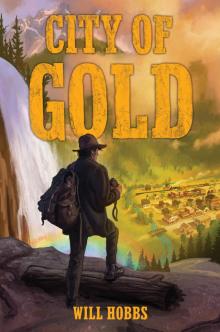 City of Gold
City of Gold Kokopelli's Flute
Kokopelli's Flute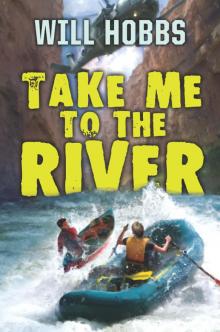 Take Me to the River
Take Me to the River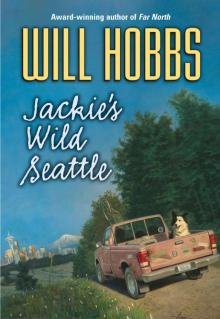 Jackie's Wild Seattle
Jackie's Wild Seattle The Maze
The Maze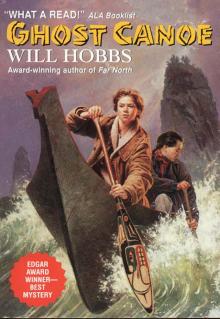 Ghost Canoe
Ghost Canoe Never Say Die
Never Say Die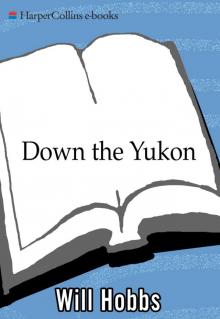 Down the Yukon
Down the Yukon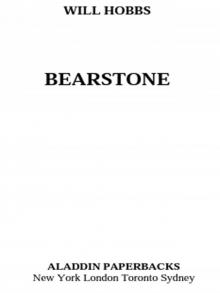 Bearstone
Bearstone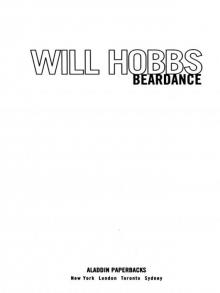 Beardance
Beardance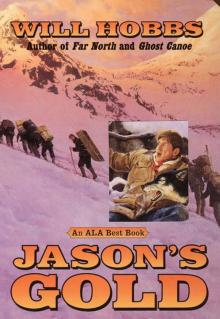 Jason's Gold
Jason's Gold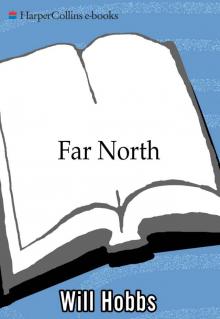 Far North
Far North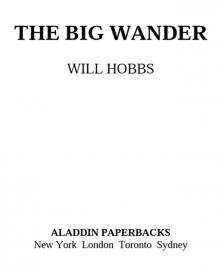 The Big Wander
The Big Wander River Thunder
River Thunder Downriver
Downriver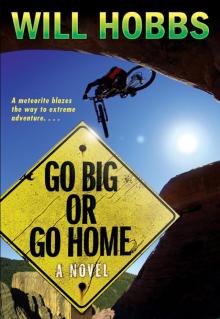 Go Big or Go Home
Go Big or Go Home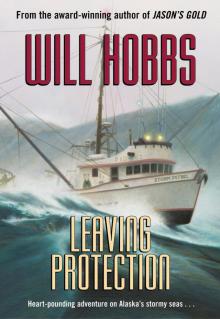 Leaving Protection
Leaving Protection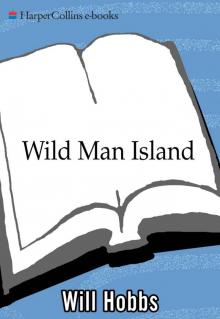 Wild Man Island
Wild Man Island